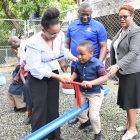Managers of the iLead educational leadership project, a public-private partnership designed to improve the general delivery of education and the management of schools, have indicated that the project’s year-end report shows improvements in key target areas.
Managers of the iLead educational leadership project, a public-private partnership designed to improve the general delivery of education and the management of schools, have indicated that the project’s year-end report shows improvements in key target areas.
For one, literacy and numeracy performance in the engaged primary schools improved by 16 per cent and nine per cent, respectively; while individual schools show achievements such as 90 per cent of their grade four students achieving mastery and the remaining 10 per cent achieving near mastery at the Grade Four Literacy Test; an increasing number of students earning perfect or near perfect scores in the Grade Six Achievement Test and being selcted by top -performing traditional high schools.
iLead was chartered by the JN Foundation in partnership with the Ministry of Education, and launched in September 2014. Initially, it targeted five primary and secondary schools in the parishes of St Mary, Portland and St Thomas, which the National Education Inspectorate had previously dubbed “failing”. They are: Port Maria Primary Brimmer Vale and Islington High in St Mary; Robert Lightbourne High in St Thomas, and Buff Bay Primary in Portland.
The programme was expanded in July 2015 to include five more primary and high schools in the same parishes.
JN Foundation’s Director of Education Programmes Dr Renee Rattray, told the Jamaica Observer that the greatest gains made were at primary schools.
“The primary schools were keen on the development and implementation of student-targeted initiatives, which focused on improving learning,” she explained.
At Buff Bay Primary in Portland, the gains were achieved by strategies targeted at the grade four level, Senior Teacher Frank Peart said.
“At the beginning of the iLead programme, we identified about 35 students who were reading at the grade two level and below, to work with the literacy coach provided through iLead, and diagnosed the specific deficiency of each child,” he explained.
“Students sat monthly tests, and through the iLead training, we used data gleaned to skillfully assess their progress and identify where the gaps were,” Peart continued.
As a result, the number of students reading at the pre-primary level, which is late kindergarten, decreased from 22 to five at the end of the 2014/2015 school year at Buff Bay Primary. Six boys who were also reading below the pre-primary level improved, leaving only three at the end of the period.
Overall, there was a 40 per cent improvement across the grade four cohort, with 103 of the 115 students who sat the Grade Four Literacy Test, or some 90 per cent of them, achieving mastery and the remaining 10 per cent achieving near mastery.
“The results of students who sat the Grade Six Achievement Test in 2015 were remarkable, with more than 15 students scoring an average of over 92 per cent. One boy scored 100 per cent for each area, except communication tasks; nine children achieved perfect scores in science; some children gained perfect scores in social studies, and many students were accepted by the traditional schools they had selected,” he said.
“Much of that success was due to the iLead intervention,” he maintained.
Peart noted, too, that data was used to drive accountability in the school’s leadership, which has registered improved administrative efficiency.
“Normally, when we appraised administrators, we did so without going through the relevant documents properly. Now, when someone is given a score of two, even if the individual complains, we can show them the data and explain: ‘If you want to improve this is what you need to do’,” he outlined.
Port Maria Primary School in St Mary also experienced significant gains. Principal Carla Ruddock noted that 66 of 157 students at grade two who were reading below their level at the start of the iLead programme, improved after four months to the grade one level.
In addition, she stated that much was being done to improve numeracy.
“Numeracy is a weak area in our school. On an average, the school has a numeracy level of about 55 per cent and we are currently addressing that,” she revealed.
The Port Maria Primary principal explained that nine teachers, who were strategically placed across different grades, have benefited from rigorous training by the Ministry of Education, which has positioned the school to improve the teaching and learning of mathematics.
Dr Rattray says the programme expects to see improvements in performance in the Caribbean Secondary Education Certificate examination this year from students at the first three high schools under the programme, noting that more students now have the opportunity to sit the examination.
“That’s an improvement because it helps to remove the negative perception that certain students should not be allowed to sit exams, when we should be setting the same expectations for all students,” said Rattray.
The Education Programmes director noted that there was major improvement in the use of data to inform interventions and maintain accountability, highlighting that nine per cent of teachers across the first five schools are now using data to assess and inform instructional effectiveness.
“Middle managers and school leaders are also becoming more involved in the classroom, with 21 per cent and 13 per cent more of them visiting classrooms to observe lessons being taught so that they can assist with developing and maintaining best practices in teaching and learning,” Dr Rattray observed.
“In the final analysis, we are assisting leaders in our schools to develop new ways of doing things. The gains may not emerge immediately, however, they will come, as leaders maintain best practices, raise expectations and develop a ‘Yes we can’ culture.”
http://www.jamaicaobserver.com/magazines/career/iLead-registers-gains-_52255




